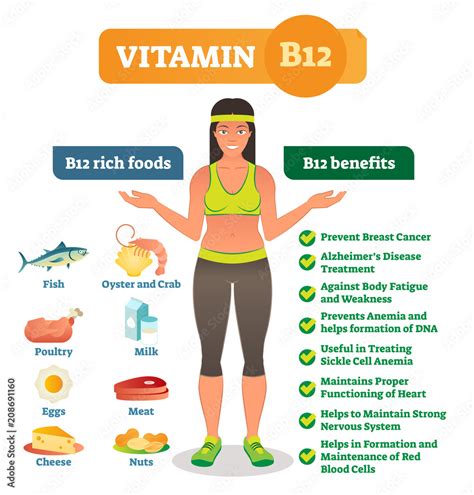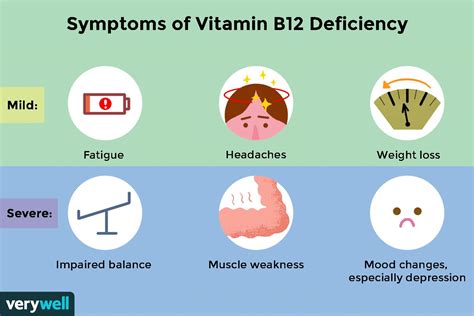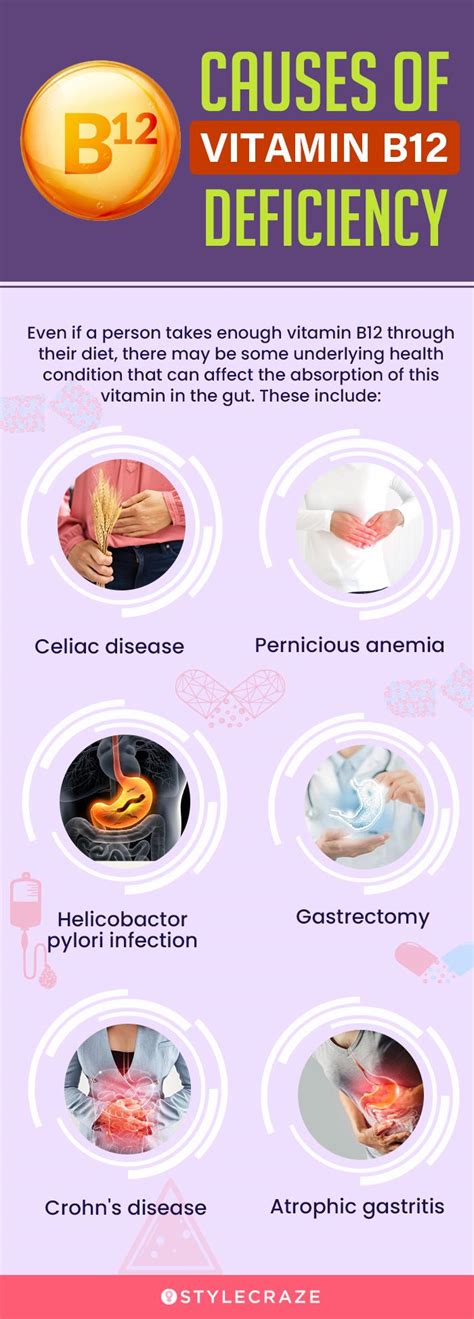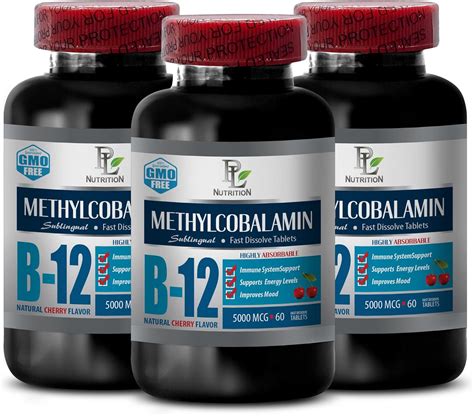Intro
Check your Vitamin B12 levels to prevent deficiency, anemia, and nerve damage. Learn about symptoms, testing, and normal ranges to ensure optimal health and wellness with accurate Vitamin B12 level checks.
Maintaining adequate levels of vitamin B12 is crucial for the proper functioning of the body. This essential nutrient plays a significant role in the production of red blood cells, nerve function, and DNA synthesis. A deficiency in vitamin B12 can lead to various health issues, including anemia, fatigue, and neurological problems. Therefore, it is essential to monitor vitamin B12 levels to ensure they are within the normal range.
Vitamin B12 deficiency is relatively common, especially among certain populations such as the elderly, vegetarians, and individuals with gastrointestinal disorders. The symptoms of a deficiency can be subtle and may take years to develop, making it challenging to diagnose. A simple blood test can help determine vitamin B12 levels, and early detection is critical to prevent long-term damage.
The importance of vitamin B12 cannot be overstated. It is a vital component of a healthy diet, and its benefits extend beyond preventing deficiency-related disorders. Vitamin B12 has been shown to have a positive impact on energy levels, cognitive function, and even mental health. As a result, many people are taking proactive steps to ensure they are getting enough vitamin B12 through their diet or supplements. In this article, we will delve into the world of vitamin B12, exploring its importance, the benefits of maintaining adequate levels, and the ways to check and maintain healthy vitamin B12 levels.
Vitamin B12 Benefits and Functions

Vitamin B12 is a complex nutrient that plays a critical role in various bodily functions. It is involved in the production of red blood cells, which are responsible for carrying oxygen throughout the body. Vitamin B12 also helps to maintain healthy nerve cells and is necessary for the synthesis of DNA and RNA. Additionally, it has been shown to have a positive impact on energy levels, cognitive function, and mental health.
The benefits of vitamin B12 are numerous, and maintaining adequate levels can have a significant impact on overall health. Some of the key benefits of vitamin B12 include:
- Energy production: Vitamin B12 is necessary for the production of ATP, which is the primary source of energy for the body.
- Nervous system function: Vitamin B12 helps to maintain healthy nerve cells and is necessary for the transmission of nerve impulses.
- Red blood cell production: Vitamin B12 is essential for the production of red blood cells, which are responsible for carrying oxygen throughout the body.
- Cognitive function: Vitamin B12 has been shown to have a positive impact on cognitive function, including memory and concentration.
- Mental health: Vitamin B12 has been linked to a reduced risk of depression and anxiety.
Vitamin B12 Deficiency Causes and Symptoms

Vitamin B12 deficiency can be caused by a variety of factors, including a lack of vitamin B12 in the diet, malabsorption, and certain medical conditions. Some of the most common causes of vitamin B12 deficiency include:
- Dietary deficiency: Vegetarians and vegans are at risk of vitamin B12 deficiency due to the lack of animal products in their diet.
- Malabsorption: Certain medical conditions, such as celiac disease and Crohn's disease, can impair the body's ability to absorb vitamin B12.
- Medications: Certain medications, such as proton pump inhibitors and histamine-2 (H2) blockers, can interfere with vitamin B12 absorption.
- Aging: The ability to absorb vitamin B12 decreases with age, making older adults more susceptible to deficiency.
The symptoms of vitamin B12 deficiency can be subtle and may take years to develop. Some of the most common symptoms include:
- Fatigue: Vitamin B12 deficiency can cause fatigue, weakness, and a lack of energy.
- Shortness of breath: Vitamin B12 deficiency can cause a decrease in red blood cell production, leading to shortness of breath.
- Dizziness: Vitamin B12 deficiency can cause dizziness and lightheadedness.
- Numbness or tingling: Vitamin B12 deficiency can cause numbness or tingling in the hands and feet.
- Cognitive impairment: Vitamin B12 deficiency has been linked to cognitive impairment, including memory loss and confusion.
Vitamin B12 Level Check and Diagnosis

Vitamin B12 levels can be checked using a simple blood test. The test measures the amount of vitamin B12 in the blood and can help diagnose a deficiency. The normal range for vitamin B12 is between 200 and 900 picograms per milliliter (pg/mL).
In addition to the blood test, a physical examination and medical history can help diagnose a vitamin B12 deficiency. The doctor may also perform additional tests, such as a complete blood count (CBC) and a blood smear, to rule out other conditions.
Treatment and Prevention of Vitamin B12 Deficiency

Treatment for vitamin B12 deficiency typically involves taking vitamin B12 supplements or receiving injections. The goal of treatment is to restore normal vitamin B12 levels and prevent long-term damage.
Prevention is key when it comes to vitamin B12 deficiency. Some of the ways to prevent a deficiency include:
- Dietary changes: Eating a balanced diet that includes animal products, such as meat, poultry, and fish, can help ensure adequate vitamin B12 levels.
- Supplements: Taking vitamin B12 supplements can help ensure adequate levels, especially for vegetarians and vegans.
- Regular check-ups: Regular check-ups with a doctor can help diagnose a deficiency early, preventing long-term damage.
Vitamin B12 Rich Foods and Supplements

Vitamin B12 can be found in a variety of foods, including:
- Animal products: Meat, poultry, fish, and dairy products are all rich in vitamin B12.
- Fortified foods: Some foods, such as plant-based milk and breakfast cereals, are fortified with vitamin B12.
- Supplements: Vitamin B12 supplements are available in various forms, including oral supplements and injections.
When choosing a vitamin B12 supplement, it is essential to consider the following factors:
- Form: Vitamin B12 supplements come in various forms, including methylcobalamin, cyanocobalamin, and adenosylcobalamin.
- Dose: The recommended daily dose of vitamin B12 varies, but most adults need between 2.4 and 2.6 micrograms per day.
- Brand: Choose a reputable brand that adheres to good manufacturing practices (GMPs).
Vitamin B12 and Health Conditions

Vitamin B12 has been linked to various health conditions, including:
- Anemia: Vitamin B12 deficiency can cause anemia, a condition characterized by a decrease in red blood cells.
- Neurological disorders: Vitamin B12 deficiency has been linked to neurological disorders, such as multiple sclerosis and Parkinson's disease.
- Cognitive impairment: Vitamin B12 deficiency has been linked to cognitive impairment, including memory loss and confusion.
- Mental health: Vitamin B12 has been linked to a reduced risk of depression and anxiety.
Vitamin B12 and Pregnancy

Vitamin B12 is essential for a healthy pregnancy. It plays a critical role in the development of the fetus and can help prevent birth defects. Some of the ways vitamin B12 supports pregnancy include:
- Fetal development: Vitamin B12 is necessary for the development of the fetus, including the formation of the brain and nervous system.
- Prevention of birth defects: Vitamin B12 has been shown to reduce the risk of birth defects, such as neural tube defects.
- Maternal health: Vitamin B12 can help support maternal health, including reducing the risk of anemia and fatigue.
Vitamin B12 and Athletes

Vitamin B12 is essential for athletes, as it plays a critical role in energy production and physical performance. Some of the ways vitamin B12 supports athletes include:
- Energy production: Vitamin B12 is necessary for the production of ATP, which is the primary source of energy for the body.
- Physical performance: Vitamin B12 can help improve physical performance, including endurance and strength.
- Recovery: Vitamin B12 can help support recovery after exercise, reducing muscle soreness and fatigue.
What are the symptoms of vitamin B12 deficiency?
+The symptoms of vitamin B12 deficiency can include fatigue, weakness, shortness of breath, dizziness, numbness or tingling in the hands and feet, and cognitive impairment.
How can I check my vitamin B12 levels?
+Vitamin B12 levels can be checked using a simple blood test. The test measures the amount of vitamin B12 in the blood and can help diagnose a deficiency.
What are the best sources of vitamin B12?
+Vitamin B12 can be found in a variety of foods, including animal products, fortified foods, and supplements. Some of the best sources of vitamin B12 include meat, poultry, fish, dairy products, and fortified plant-based milk.
Can vitamin B12 deficiency be prevented?
+Yes, vitamin B12 deficiency can be prevented by eating a balanced diet that includes animal products, taking supplements, and getting regular check-ups with a doctor.
What are the benefits of taking vitamin B12 supplements?
+The benefits of taking vitamin B12 supplements include improving energy levels, supporting nerve function, and reducing the risk of anemia and other health conditions.
In conclusion, maintaining adequate levels of vitamin B12 is crucial for overall health and well-being. By understanding the importance of vitamin B12, the benefits of maintaining adequate levels, and the ways to check and maintain healthy vitamin B12 levels, individuals can take proactive steps to support their health. Whether through dietary changes, supplements, or regular check-ups with a doctor, prioritizing vitamin B12 is essential for preventing deficiency-related disorders and promoting optimal health. We encourage you to share this article with others, and we invite you to comment below with any questions or concerns you may have about vitamin B12.
